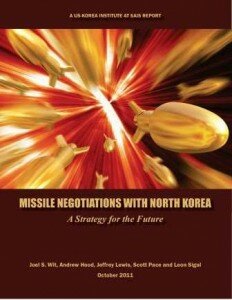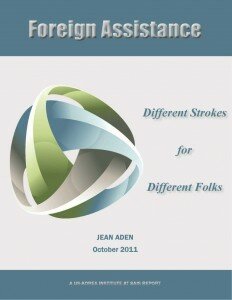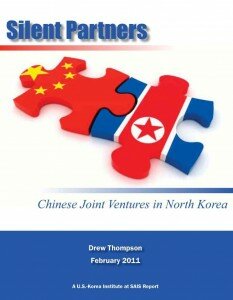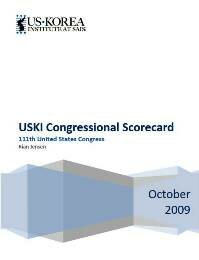 While public attention has been focused on restarting denuclearization talks with North Korea, an important component of any renewed dialogue with Pyongyang will be controlling its ballistic missile program. That effort has been moving gradually but steadily ahead since the North ended its unilateral test moratorium in 2006 with the further development of threatening technologies, as well as the deployment of new models. Secretary of Defense Robert Gates recently highlighted the dangers posed by this effort during his January trip to Asia. He stated, “With the North Koreans’ continuing development of nuclear weapons and their development of intercontinental ballistic missiles, North Korea is becoming a direct threat to the United States, and we have to take that into account.” growing nuclear weapons stockpile and increasingly capable delivery systems will pose a serious danger to the region, and eventually perhaps even to the United States. In short, if the Six Party Talks resume, a high priority for the United States will be to also start negotiations that cover missiles.
While public attention has been focused on restarting denuclearization talks with North Korea, an important component of any renewed dialogue with Pyongyang will be controlling its ballistic missile program. That effort has been moving gradually but steadily ahead since the North ended its unilateral test moratorium in 2006 with the further development of threatening technologies, as well as the deployment of new models. Secretary of Defense Robert Gates recently highlighted the dangers posed by this effort during his January trip to Asia. He stated, “With the North Koreans’ continuing development of nuclear weapons and their development of intercontinental ballistic missiles, North Korea is becoming a direct threat to the United States, and we have to take that into account.” growing nuclear weapons stockpile and increasingly capable delivery systems will pose a serious danger to the region, and eventually perhaps even to the United States. In short, if the Six Party Talks resume, a high priority for the United States will be to also start negotiations that cover missiles.
Stories Filed Under “Special Reports”
Missile Negotiations with North Korea
Korea and ODA: Exploring Existing Models
 The US-Korea Institute at SAIS is pleased to release the first report in a three-part series by Dr. Jean Aden, examining South Korea’s ODA future.
The US-Korea Institute at SAIS is pleased to release the first report in a three-part series by Dr. Jean Aden, examining South Korea’s ODA future.
Having accomplished one of the most successful economic transformations of the twentieth century, transitioning from a major aid recipient to major aid provider within fifty years, Korea has recent firsthand development knowledge and experience to share with others who are in the process of development, and is keen to develop its position as a donor and member of the international donor community, commensurate with the size of its economy. Despite having only recently joined the DAC, the OECD’s choice to locate the 4th High Level Forum for Development Effectiveness (HLF-4) in Busan in November 2011 is an indicator of Korea’s potential to help shape the strategic agenda, while expanding its own development commitments. read more …
Whither or Wither?
 In November 2010, the U.S.-Korea Institute at SAIS and Korea Institute of Finance, co-hosted the event, “State of the World Economy, 2011-2012: Whither or Wither?” sponsored by the Asian Studies Program at SAIS and the JoongAng Ilbo. This conference was meant to facilitate the exchange of predictions, as well as the assumptions underpinning those predictions, for the global economy over the next two years among such noted economists as Kevin H. O’Rourke, John B. Taylor, Daniel Rosen, Marcus Noland, and more. Special emphasis was placed on key economies such as China, India, Japan, and South Korea.
In November 2010, the U.S.-Korea Institute at SAIS and Korea Institute of Finance, co-hosted the event, “State of the World Economy, 2011-2012: Whither or Wither?” sponsored by the Asian Studies Program at SAIS and the JoongAng Ilbo. This conference was meant to facilitate the exchange of predictions, as well as the assumptions underpinning those predictions, for the global economy over the next two years among such noted economists as Kevin H. O’Rourke, John B. Taylor, Daniel Rosen, Marcus Noland, and more. Special emphasis was placed on key economies such as China, India, Japan, and South Korea.
This volume contains the speeches and papers (further refined and edited post-conference) presented at that conference, in order to help inform and advise both policymakers and the general public on what may be in store in the coming years.
Download “State of the World Economy, 2011-2012, Whither or Wither?“ in full or by chapter here.
Report Release: Northeast Asia in Afghanistan
 The U.S.-Korea Institute at SAIS and the Center for the National Interest are pleased to announce the release of the joint report “Northeast Asia in Afghanistan: Whose Silk Road?“, co-authored by Jae H. Ku, Drew Thompson, and Daniel Wertz.
The U.S.-Korea Institute at SAIS and the Center for the National Interest are pleased to announce the release of the joint report “Northeast Asia in Afghanistan: Whose Silk Road?“, co-authored by Jae H. Ku, Drew Thompson, and Daniel Wertz.
Report Release: Chinese Joint Ventures in North Korea
 On February 3, 2011, the U.S.-Korea Institute at SAIS released a new report by Drew Thompson, Director of China Studies at The Nixon Center: Silent Partners: Chinese Joint Ventures in North Korea. China is considered North Korea’s economic lifeline. Chinese aid, trade and investment is critical to North Korea’s social stability and economic productivity and a key source of technology and hard currency. Presumably, without this trade and investment, Kim Jong-il would lack the means to secure the allegiance of elites that support his rule, making trade and investment with China particularly important for ensuring the regime’s survival. Joint ventures with China are an important aspect of the bilateral relationship, because in addition to propping up the regime in Pyongyang, they contribute to economic development in China’s northeastern “rust belt.” These Chinese financial investments in the DPRK are geopolitically significant not only in terms of Chinese strategic interests but also for South Korean aspirations to unify the peninsula.
On February 3, 2011, the U.S.-Korea Institute at SAIS released a new report by Drew Thompson, Director of China Studies at The Nixon Center: Silent Partners: Chinese Joint Ventures in North Korea. China is considered North Korea’s economic lifeline. Chinese aid, trade and investment is critical to North Korea’s social stability and economic productivity and a key source of technology and hard currency. Presumably, without this trade and investment, Kim Jong-il would lack the means to secure the allegiance of elites that support his rule, making trade and investment with China particularly important for ensuring the regime’s survival. Joint ventures with China are an important aspect of the bilateral relationship, because in addition to propping up the regime in Pyongyang, they contribute to economic development in China’s northeastern “rust belt.” These Chinese financial investments in the DPRK are geopolitically significant not only in terms of Chinese strategic interests but also for South Korean aspirations to unify the peninsula.
Download a copy of “Silent Partners” by Drew Thompson and event transcripts HERE.
Pursuing Peace While Advancing Rights: The Untried Approach to North Korea
 On May 17, 2010, the U.S.-Korea Institute at SAIS released a new report by David Hawk: “Pursuing Peace While Advancing Rights: The Untried Approach to North Korea.” This report argues that the reigning paradigm—the idea that either centrally involved nation-states seek to reconcile, engage, and negotiate with the DPRK, in which case raising human rights issues is taboo, or another government raises human rights issues but forgoes engagement and negotiations—is all wrong. This report seeks to make the case that the two should go hand in hand, and outlines an alternative paradigm, which combines the search for peace with the promotion of human rights, and suggests some ways that this alternative, as yet untried, approach might be pursued. read more …
On May 17, 2010, the U.S.-Korea Institute at SAIS released a new report by David Hawk: “Pursuing Peace While Advancing Rights: The Untried Approach to North Korea.” This report argues that the reigning paradigm—the idea that either centrally involved nation-states seek to reconcile, engage, and negotiate with the DPRK, in which case raising human rights issues is taboo, or another government raises human rights issues but forgoes engagement and negotiations—is all wrong. This report seeks to make the case that the two should go hand in hand, and outlines an alternative paradigm, which combines the search for peace with the promotion of human rights, and suggests some ways that this alternative, as yet untried, approach might be pursued. read more …
Special Report: USKI Congressional Scorecard 2009
 The U.S.-Korea Institute at SAIS is pleased to announce the release of the USKI Congressional Scorecard 2009. This report identifies relevant legislation in the 111th United States Congress pertaining U.S.-Korea relations and the Korean-American community. At this point, the report does not take a position on members’ voting behavior nor assesses the merit of relevant legislation. However, it does provide a central source for learning how our elected officials have voted on the issues that impact Korean Americans and Korean affairs. read more …
The U.S.-Korea Institute at SAIS is pleased to announce the release of the USKI Congressional Scorecard 2009. This report identifies relevant legislation in the 111th United States Congress pertaining U.S.-Korea relations and the Korean-American community. At this point, the report does not take a position on members’ voting behavior nor assesses the merit of relevant legislation. However, it does provide a central source for learning how our elected officials have voted on the issues that impact Korean Americans and Korean affairs. read more …

